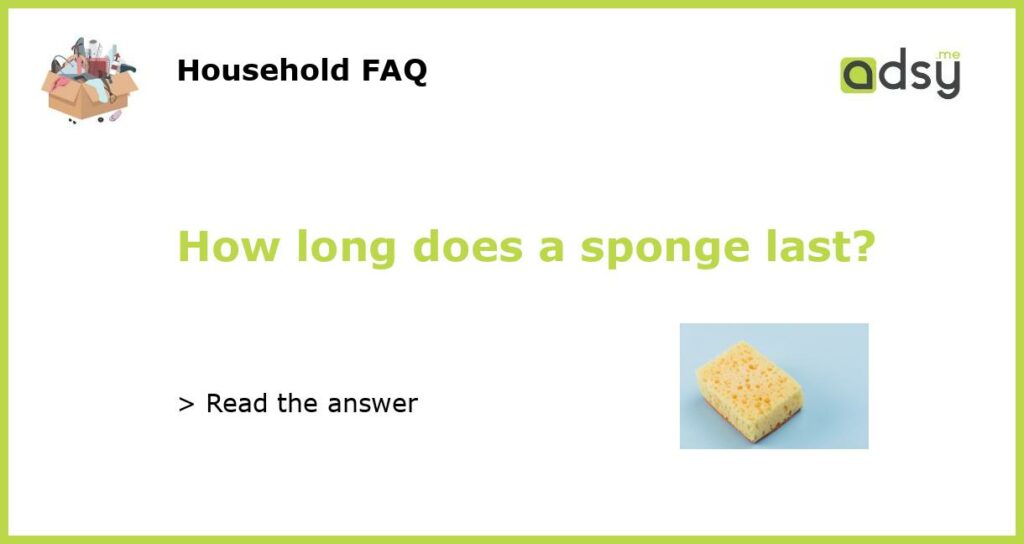How long does a sponge last?
Whether you use sponges for cleaning, bathing, or applying makeup, knowing how long they last is essential for hygiene and to get the best results. However, there is no one-size-fits-all answer to this question, as the lifespan of a sponge can vary depending on several factors. Let’s dive in and explore how long sponges typically last.
Factors that affect the lifespan of a sponge
Several factors can influence how long a sponge lasts. These factors include:
- Frequency of use: Using a sponge frequently can contribute to its wear and tear, which may reduce its lifespan.
- Type of sponge: Different types of sponges are designed for specific purposes. For example, household cleaning sponges may have a shorter lifespan compared to cosmetic sponges.
- Cleaning method: The way you clean your sponge can also impact its durability. Proper cleaning and maintenance can help prolong its lifespan.
- Quality of the sponge: Sponges made from higher-quality materials may last longer than those made from lower-quality materials.
Typical lifespan of different types of sponges
While there is no universal timeline for how long a sponge lasts, here are some general guidelines for different types of sponges:
Household cleaning sponges
Household cleaning sponges, typically used for washing dishes, scrubbing surfaces, and general cleaning, tend to have a shorter lifespan. On average, they last for a few weeks to a couple of months, depending on how often they are used and how well they are maintained. Over time, household cleaning sponges can become less effective and start to deteriorate, indicating that it’s time for a replacement.
Bath sponges
Bath sponges, also known as loofahs, are used for exfoliating and cleansing the body. The lifespan of bath sponges can vary depending on their quality and how well they are cared for. On average, a bath sponge can last for a few months to a year. Signs that a bath sponge needs to be replaced include discoloration, foul odor, or noticeable wear and tear.
Makeup sponges
Makeup sponges, such as beauty blenders, are popular tools for applying foundation, concealer, and other makeup products. The lifespan of a makeup sponge depends on its quality, frequency of use, and how well it is cleaned. On average, a makeup sponge can last for three to four months with proper care. It’s important to regularly clean makeup sponges to prevent bacteria buildup and extend their lifespan.
Art sponges
Art sponges are used by artists for various creative purposes, such as blending paints and creating textures. The lifespan of an art sponge can depend on factors like the type of art medium used and how well it is cleaned. With proper maintenance, art sponges can last for several months to a few years. However, they should be replaced if they start to degrade or become less effective in achieving the desired artistic effects.
How to extend the lifespan of a sponge
To make your sponges last longer, here are some tips:
- Clean sponges regularly: Rinse sponges thoroughly after each use and allow them to air dry. For sponges used in the kitchen and bathroom, soaking them in a mixture of water and bleach (follow the manufacturer’s instructions) or microwaving them for a short period can help kill bacteria.
- Replace sponges when necessary: Pay attention to signs of wear and tear, foul odors, discoloration, or reduced effectiveness. If your sponge is showing these signs, it’s time to replace it.
- Use the right sponge for the task: Using a sponge that is specifically designed for the task at hand can help prolong its lifespan. For example, using a kitchen sponge for household cleaning tasks may cause it to deteriorate more quickly.
- Store sponges properly: After cleaning, make sure to store your sponges in a dry and well-ventilated area to prevent bacterial growth. Hanging them in an upright position can help them dry faster.
While the lifespan of a sponge can vary depending on factors such as frequency of use, type of sponge, cleaning method, and quality, knowing when to replace your sponges is crucial for hygiene and achieving optimal results. By following proper cleaning and maintenance practices, you can extend the lifespan of your sponges and get the most out of them.






